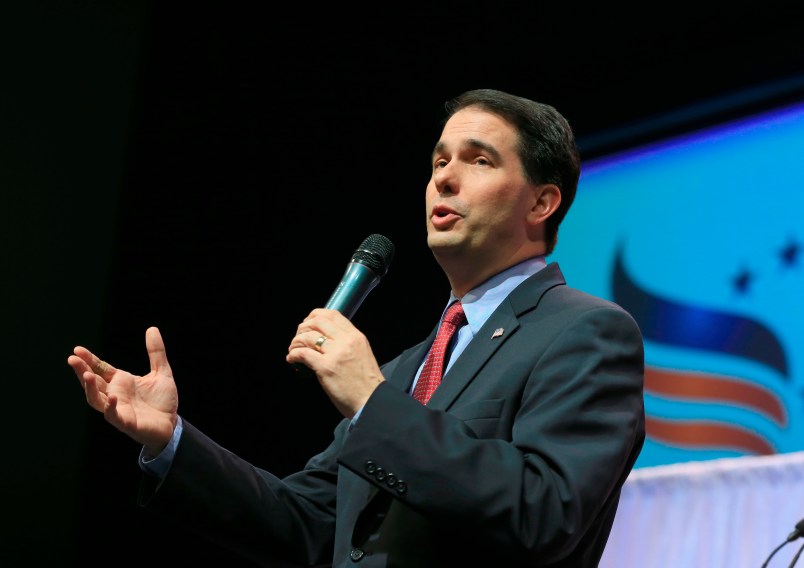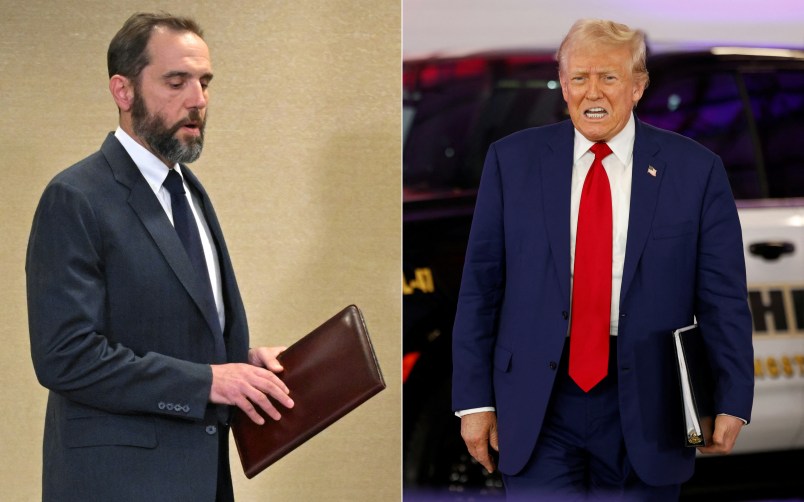A provision in a Wisconsin budget package that would have gutted the state’s open records laws were scrapped after the Gov. Scott Walker (R) and the GOP legislative leadership came under intense scrutiny. However, a number of other consequential policy initiatives tucked into the larger budget bill remain intact. Some provisions appear to double down on Walker’s longstanding war on labor. Others roll back efforts to hold law enforcement accountable through transparency measures.
The governor’s office did not return TPM’s request for comment as to whether Walker, who will make his run for the White House official next week, intended to support or veto the measures. However, in the fallout over the open records law changes, legislators of both parties signaled his office was aware — if not approving — of all the provisions in the budget package, known as Motion 999, that passed the Joint Finance Committee on Thursday.
Here is what else is the package:
Changes the state’s pension board: One provision would alter the composition of the state board tasked with assessing any potential changes to Wisconsin’s retirement system for public employees. Currently, the board, known as the Joint Survey in Retirement Systems Committee, is made up of a mix of lawmakers of both parties, representatives from relevant state agencies and a citizen who is not participating in the state retirement program. If Motion 999 becomes law, it will instead consist of only legislators, with the number chosen by the majority party proportional to the ruling party’s majority on other legislative committees, in effect politicizing the board.
The change comes as Walker has struggled to push through measures that would alter the state’s current pension plan. Though Wisconsin’s retirement program is one the most financially sound in the nation, Walker has signaled he would be willing to overhaul the system, only to receive pushback. Officials at the agencies represented on the board have previously said changes to the state’s retirement plan weren’t necessary, however a board made up of entirely partisan legislators might be more likely to greenlight such a plan. Both houses of the Wisconsin legislature and the governorship are currently controlled by Republicans.
Redefinition of Wisconsin’s “living wage:” A 1913 law stipulating that Wisconsin’s minimum wage “shall not be less than a living wage” has prompted a legal challenge to Wisconsin’s current $7.25 minimum wage, which was brought by low wage workers last fall against Walker after the state refused to consider their complaint that $7.25 did not qualify as a living wage.
A provision in Motion 999 undermines that and future legal challenges, as well as the larger discussion they provoke, by wiping mention of “living wage” from Wisconsin’s books and replacing with it “minimum wage,” at the currently established levels.
Attacks on limits on the seven-day work week: Under Motion 999, factory or mercantile workers will be allowed to opt-out of regulations requiring that employees receive 24 hours off within every seven consecutive work days.
Doubling down on Walker’s war on public sector unions: A provision in Motion 999 requires that government workers seeking to unionize win the support of 51 percent of all the workers in the affected pool, rather than just a majority of those voting. In doing so, it further streamlines Walker’s controversial anti-public-sector-union legislation passed in 2011 as part of Act 10.
Elections to initiate new public sector unions were left out of Act 10’s new standards for unions to maintain their negotiating abilities. The 2011 law established that public sector unions would need to vote to recertify annually — as opposed to the special circumstances that previously prompted a recertification — and also increased the level of support required, as workers who do not vote in union elections essentially count as a vote against recertifying. Under Motion 999, that standard of support would also apply to efforts to start a union, which currently operate on the old, majority of voters standard.
Restricts what is disclosed in public reports of police involved-civilian deaths: Even before police misconduct became a national issue, it was a hot topic in Wisconsin, with legislators passing a law in 2014 requiring outside investigations of civilian deaths at police hands.
One of Thursday’s provisions puts new limits on what investigators are allowed to disclosure in reports released to the public, requiring investigators weigh the public’s right to know the details of incident against the potential harm a disclosure could have on those involved.
Revoking previous oversight efforts of law enforcement’s use of military grade weapons: Motion 999 rolls back a previous provision approved by the Joint Finance Committee to monitor the use of military equipment given to local and state law enforcement by the federal government. Those measures included developing policies regarding agencies’ use of such equipment, requiring reporting of when military equipment is used by local and state law enforcement, and mandating that law enforcement makes public any request for military equipment. Motion 999 eliminates those provisions.











Let’s see:
Gut Wisconsin’s retirement system for public employees? Check.
Removing 1913 law stipulating that Wisconsin’s minimum wage “shall not be less than a living wage” Check
Allowing factories to force workers to work 7 day weeks in perpetuity. Check. (Koch bros. special)
More restrictions on unions. Check. (Of course)
Limiting police transparency in instances of civilian deaths. Ohhh yeah…
Revoking previous oversight efforts of law enforcement’s use of military grade weapons. Check, and What The Fuck?
It almost seemed as though the public records portion was a ruse to get the other stuff through without notice. They figured if it gets scrutiny they’ll pull it out, if not BONUS!
Glad this article compiles other matters in the bill but it still leaves out the Enbridge pipeline I read about yesterday. I hope it gets updated with that inclusion.
And that my friends, has the putrid smell of Koch dollars and energy lobbyists. written all over it.
I am REALLY glad I don’t live in Wisconsin.
C’mon Wisconsin, if you can’t get rid of that puke Walker, maybe you can buy the Milwaukee newspaper?